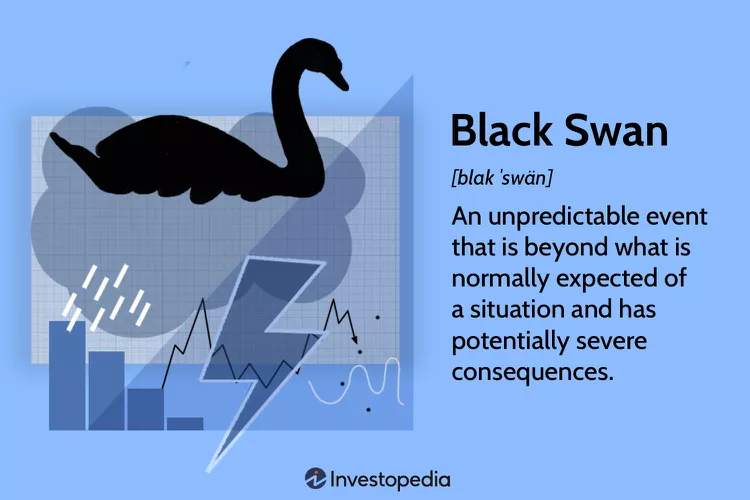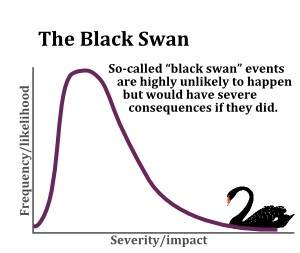Black Swan event
From: investopedia.com
Picture this: You’re planning your future, considering all the possibilities and contingencies that might arise. You’re confident in your preparations, thinking you’ve covered all the bases. But then, out of nowhere, a black swan event occurs – an event so unlikely and unpredictable that it catches you completely off guard. As Mark Twain once said, “Truth is stranger than fiction, but it is because Fiction is obliged to stick to possibilities; Truth isn’t.” And in the realm of real life, black swan events are not only possible, they’re inevitable. They have happened in the past, and they will continue to happen in the future. In this article, we explore the fascinating concept of black swan events – those rare and unexpected moments that have the power to completely upend our lives and challenge our assumptions about the world. So buckle up and get ready for a wild ride – because the truth, as they say, can be stranger than fiction.
The term “black swan event” refers to a highly unpredictable, rare, and catastrophic event that has a significant impact on society, economy, or other complex systems. The concept was popularized by Nassim Nicholas Taleb, a Lebanese-American author, mathematician, and philosopher.
Taleb wrote about the idea of a black swan event in a 2007 book prior to the events of the 2008 financial crisis. Taleb argued that because black swan events are impossible to predict due to their extreme rarity, yet have catastrophic consequences, it is important for people to always assume a black swan event is a possibility, whatever it may be, and to try to plan accordingly.1 Some believe that diversification may offer some protection when a black swan event does occur.
Taleb later used the 2008 financial crisis and the idea of black swan events to argue that if a broken system is allowed to fail, it actually strengthens it against the catastrophe of future black swan events. He also argued that conversely, a system that is propped up and insulated from risk ultimately becomes more vulnerable to catastrophic loss in the face of rare, unpredictable events.
Taleb describes a black swan as an event that:
- It is so rare that even the possibility that it might occur is unknown
- Has a catastrophic impact when it does occur
- It is explained in hindsight as if it were actually predictable

In the past, people believed that all swans were white, since all they had ever seen were white swans. However, the discovery of black swans in Australia in the 17th century overturned that assumption, and the term “black swan” has since been used to describe events that were considered quite improbable or impossible based on previous experience or knowledge.
Black swan events can have a wide range of consequences, from positive to negative. For example, the invention of the internet, the discovery of antibiotics, and the landing on the moon were all positive black swan events that had a profound impact on society. On the other hand, events such as natural disasters, terrorist attacks, and financial crises are examples of negative black swan events that can cause significant damage.
There are many examples of black swan events that have occurred throughout history. Here are a few notable examples:
- The 9/11 terrorist attacks: The attacks on the World Trade Center and the Pentagon in 2001 were a significant black swan event. The attacks were highly unpredictable, and their impact on global politics, economics, and security has been significant and long-lasting.
- The COVID-19 pandemic: The emergence of the COVID-19 pandemic in 2020 was a classic black swan event. The pandemic was highly unpredictable, and its impact on global health, economies, and societies has been massive and ongoing.
- The 2008 financial crisis: The collapse of Lehman Brothers and the subsequent global financial crisis was a black swan event that had a significant impact on the global economy. The crisis was largely unexpected and led to a massive economic downturn that affected many countries and industries.
- The Fukushima nuclear disaster: The earthquake and tsunami that struck Japan in 2011 and led to the Fukushima nuclear disaster were black swan events. The disaster was highly unexpected and had significant consequences for the region’s population and environment.
- The fall of the Berlin Wall: The collapse of the Soviet Union and the fall of the Berlin Wall in 1989 were black swan events that had a profound impact on global politics and history. The end of the Cold War was largely unexpected and ushered in a new era of global politics and international relations

Black swan events are difficult to predict or prepare for, as they often occur without warning and have significant consequences that can be difficult to anticipate. However, it is important to recognize the potential for such events and take steps to build resilience and adaptability into complex systems to minimize the impact of these events when they do occur.
Data sources:
- https://www.investopedia.com/terms/b/blackswan.asp
- https://corporatefinanceinstitute.com/resources/economics/black-swan-event/
- https://en.wikipedia.org/wiki/Black_swan_theory
শিক্ষাবর্ষঃ ২০১৯-২০















